Unilever: Vision, Leadership Styles, Management Practices, and Culture
VerifiedAdded on 2021/02/22
|10
|3183
|113
Report
AI Summary
This report provides a detailed analysis of Unilever, a multinational consumer goods company. It begins with a brief history and overview of the business, followed by an examination of its vision, leadership styles (including democratic, autocratic, laissez-faire, transformational, and transactional), management practices (performance management, work-life balance, employee engagement, and training and development), and organizational culture. The report explores how these elements influence business functions and strategies, emphasizing the impact of leadership styles and management practices on employee satisfaction and business outcomes. It then offers recommendations for improving leadership, management, and overall business strategies, concluding with a summary of the key findings and insights into Unilever's approach to sustainable living and its impact on its global operations. The report highlights the interconnectedness of leadership, culture, and management in driving business success and achieving strategic goals.
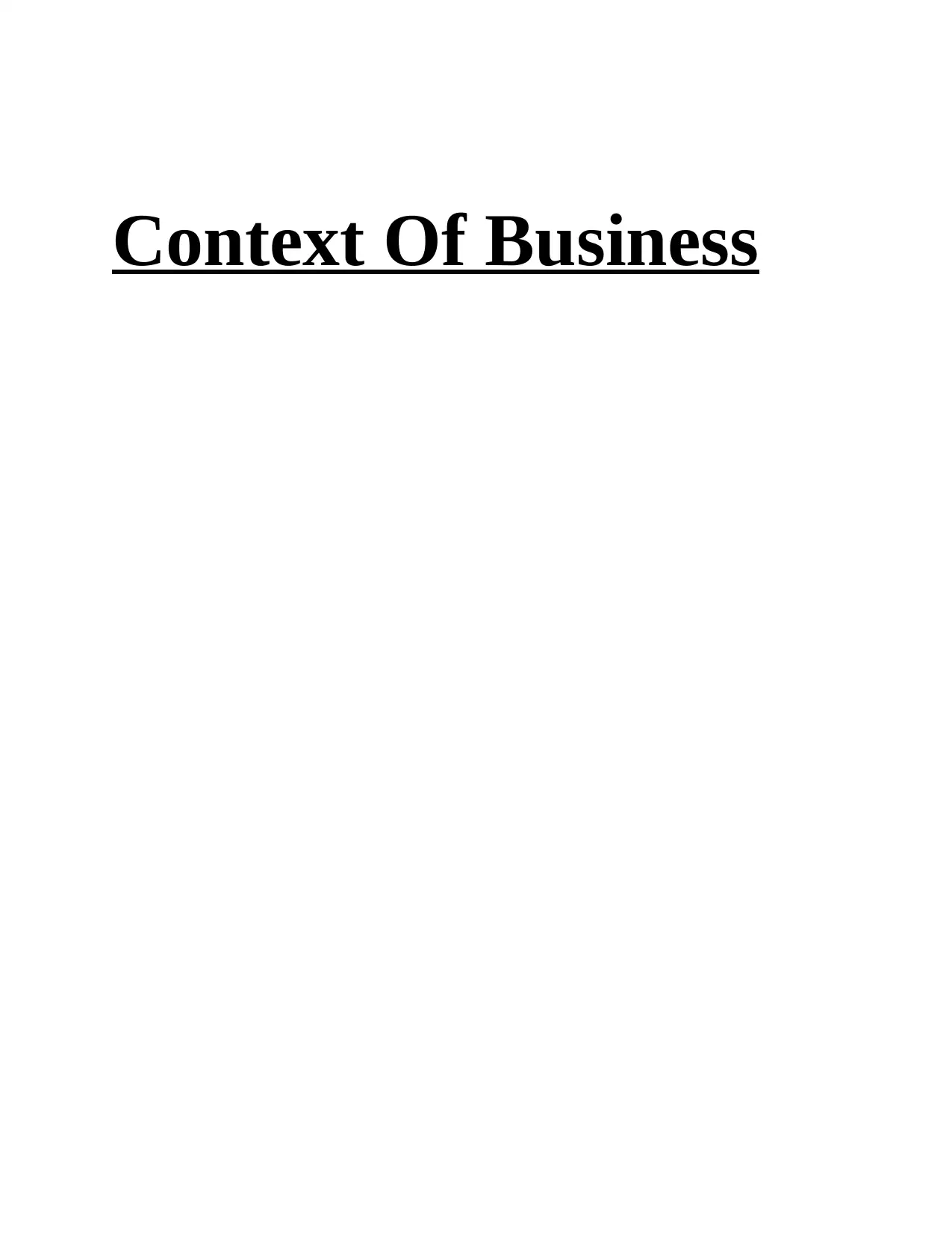
Context Of Business
Paraphrase This Document
Need a fresh take? Get an instant paraphrase of this document with our AI Paraphraser
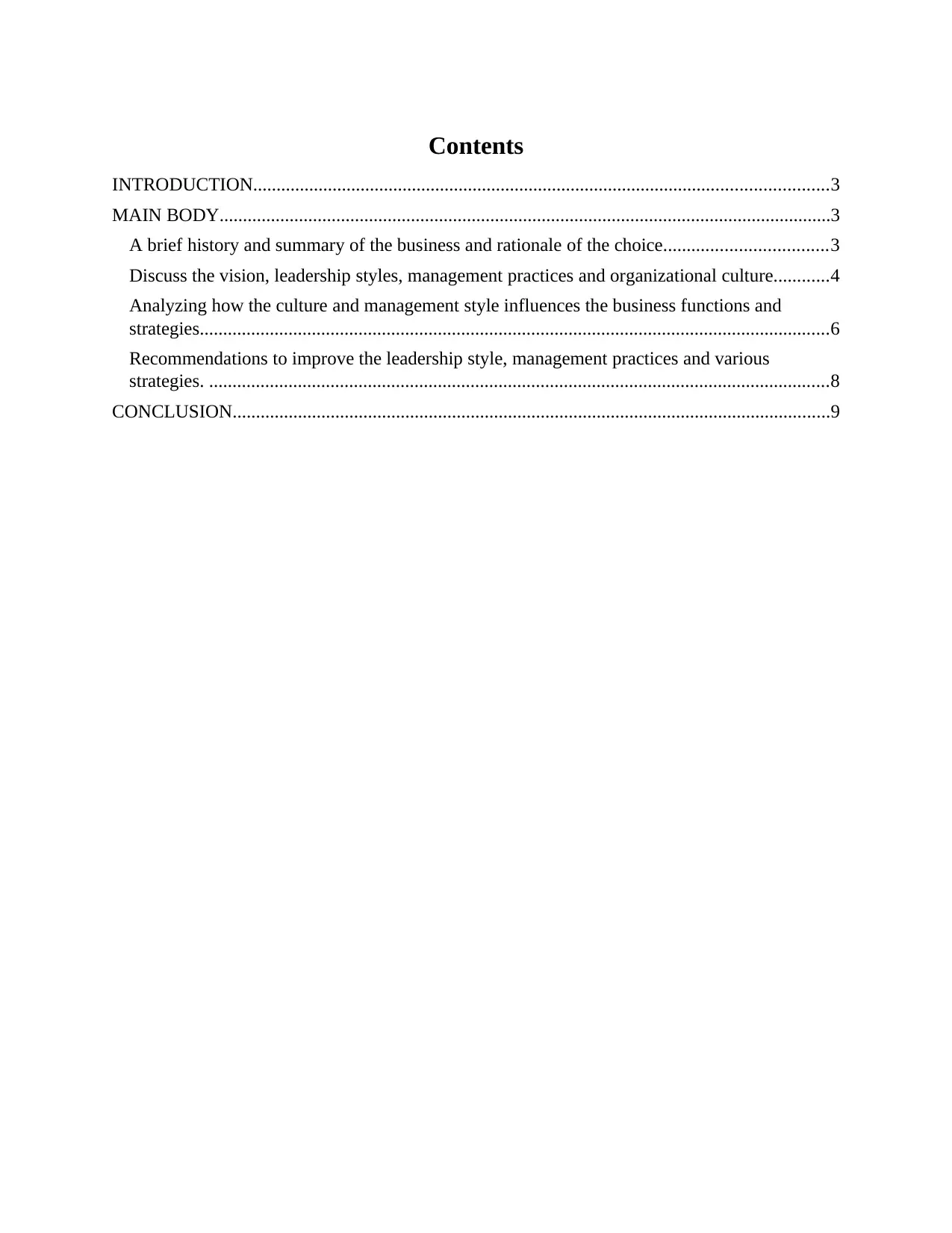
Contents
INTRODUCTION...........................................................................................................................3
MAIN BODY...................................................................................................................................3
A brief history and summary of the business and rationale of the choice...................................3
Discuss the vision, leadership styles, management practices and organizational culture............4
Analyzing how the culture and management style influences the business functions and
strategies.......................................................................................................................................6
Recommendations to improve the leadership style, management practices and various
strategies. .....................................................................................................................................8
CONCLUSION................................................................................................................................9
INTRODUCTION...........................................................................................................................3
MAIN BODY...................................................................................................................................3
A brief history and summary of the business and rationale of the choice...................................3
Discuss the vision, leadership styles, management practices and organizational culture............4
Analyzing how the culture and management style influences the business functions and
strategies.......................................................................................................................................6
Recommendations to improve the leadership style, management practices and various
strategies. .....................................................................................................................................8
CONCLUSION................................................................................................................................9
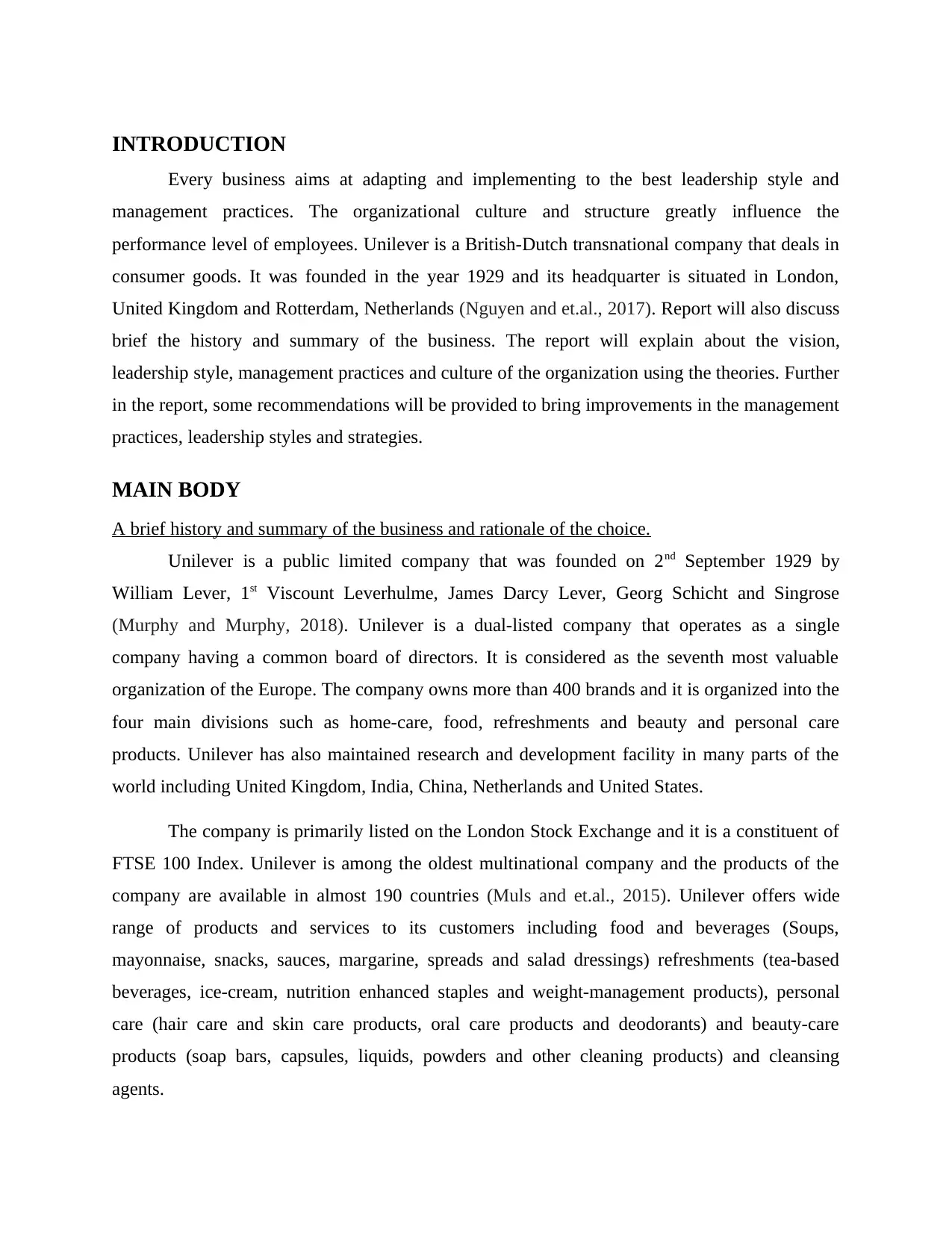
INTRODUCTION
Every business aims at adapting and implementing to the best leadership style and
management practices. The organizational culture and structure greatly influence the
performance level of employees. Unilever is a British-Dutch transnational company that deals in
consumer goods. It was founded in the year 1929 and its headquarter is situated in London,
United Kingdom and Rotterdam, Netherlands (Nguyen and et.al., 2017). Report will also discuss
brief the history and summary of the business. The report will explain about the vision,
leadership style, management practices and culture of the organization using the theories. Further
in the report, some recommendations will be provided to bring improvements in the management
practices, leadership styles and strategies.
MAIN BODY
A brief history and summary of the business and rationale of the choice.
Unilever is a public limited company that was founded on 2nd September 1929 by
William Lever, 1st Viscount Leverhulme, James Darcy Lever, Georg Schicht and Singrose
(Murphy and Murphy, 2018). Unilever is a dual-listed company that operates as a single
company having a common board of directors. It is considered as the seventh most valuable
organization of the Europe. The company owns more than 400 brands and it is organized into the
four main divisions such as home-care, food, refreshments and beauty and personal care
products. Unilever has also maintained research and development facility in many parts of the
world including United Kingdom, India, China, Netherlands and United States.
The company is primarily listed on the London Stock Exchange and it is a constituent of
FTSE 100 Index. Unilever is among the oldest multinational company and the products of the
company are available in almost 190 countries (Muls and et.al., 2015). Unilever offers wide
range of products and services to its customers including food and beverages (Soups,
mayonnaise, snacks, sauces, margarine, spreads and salad dressings) refreshments (tea-based
beverages, ice-cream, nutrition enhanced staples and weight-management products), personal
care (hair care and skin care products, oral care products and deodorants) and beauty-care
products (soap bars, capsules, liquids, powders and other cleaning products) and cleansing
agents.
Every business aims at adapting and implementing to the best leadership style and
management practices. The organizational culture and structure greatly influence the
performance level of employees. Unilever is a British-Dutch transnational company that deals in
consumer goods. It was founded in the year 1929 and its headquarter is situated in London,
United Kingdom and Rotterdam, Netherlands (Nguyen and et.al., 2017). Report will also discuss
brief the history and summary of the business. The report will explain about the vision,
leadership style, management practices and culture of the organization using the theories. Further
in the report, some recommendations will be provided to bring improvements in the management
practices, leadership styles and strategies.
MAIN BODY
A brief history and summary of the business and rationale of the choice.
Unilever is a public limited company that was founded on 2nd September 1929 by
William Lever, 1st Viscount Leverhulme, James Darcy Lever, Georg Schicht and Singrose
(Murphy and Murphy, 2018). Unilever is a dual-listed company that operates as a single
company having a common board of directors. It is considered as the seventh most valuable
organization of the Europe. The company owns more than 400 brands and it is organized into the
four main divisions such as home-care, food, refreshments and beauty and personal care
products. Unilever has also maintained research and development facility in many parts of the
world including United Kingdom, India, China, Netherlands and United States.
The company is primarily listed on the London Stock Exchange and it is a constituent of
FTSE 100 Index. Unilever is among the oldest multinational company and the products of the
company are available in almost 190 countries (Muls and et.al., 2015). Unilever offers wide
range of products and services to its customers including food and beverages (Soups,
mayonnaise, snacks, sauces, margarine, spreads and salad dressings) refreshments (tea-based
beverages, ice-cream, nutrition enhanced staples and weight-management products), personal
care (hair care and skin care products, oral care products and deodorants) and beauty-care
products (soap bars, capsules, liquids, powders and other cleaning products) and cleansing
agents.
⊘ This is a preview!⊘
Do you want full access?
Subscribe today to unlock all pages.

Trusted by 1+ million students worldwide
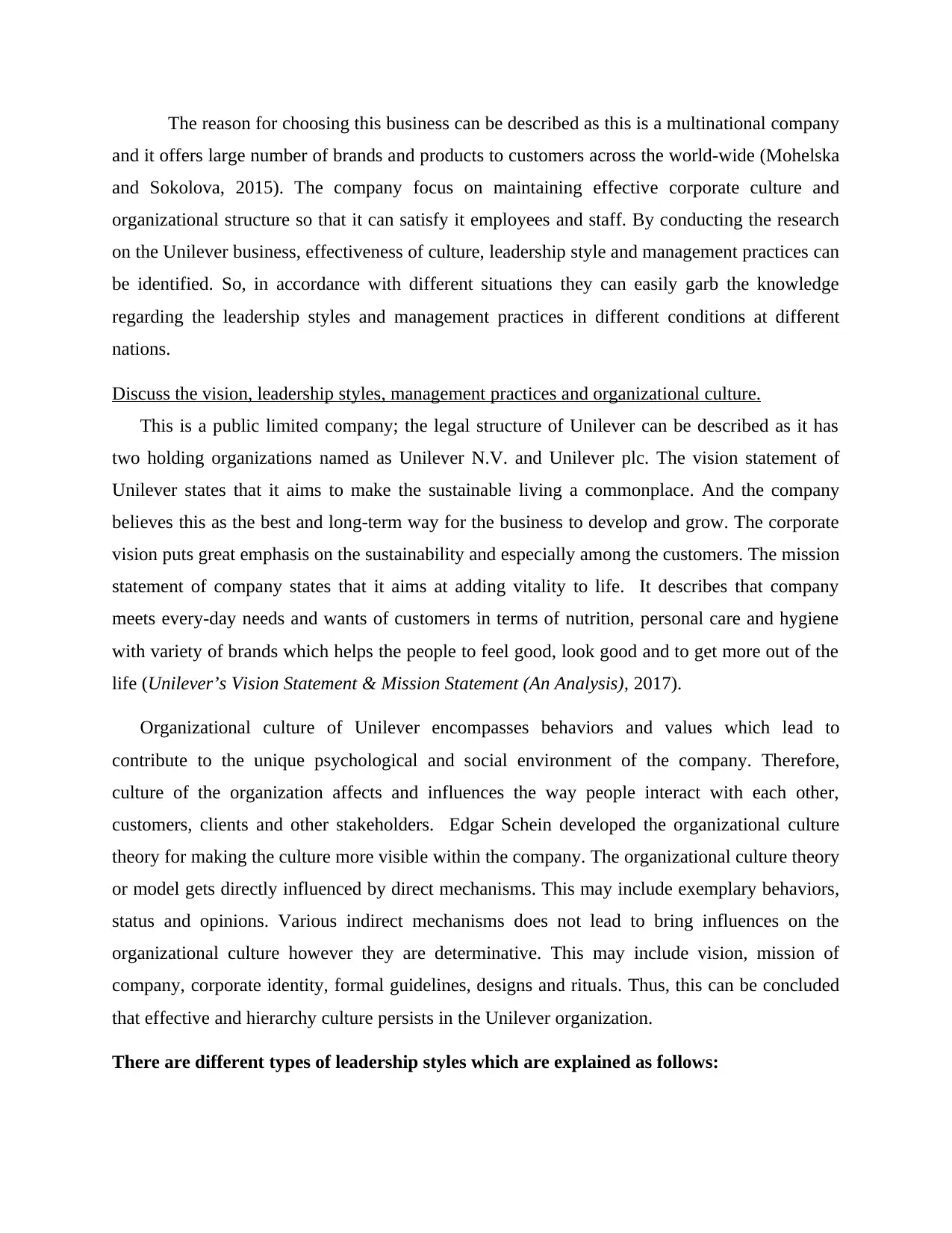
The reason for choosing this business can be described as this is a multinational company
and it offers large number of brands and products to customers across the world-wide (Mohelska
and Sokolova, 2015). The company focus on maintaining effective corporate culture and
organizational structure so that it can satisfy it employees and staff. By conducting the research
on the Unilever business, effectiveness of culture, leadership style and management practices can
be identified. So, in accordance with different situations they can easily garb the knowledge
regarding the leadership styles and management practices in different conditions at different
nations.
Discuss the vision, leadership styles, management practices and organizational culture.
This is a public limited company; the legal structure of Unilever can be described as it has
two holding organizations named as Unilever N.V. and Unilever plc. The vision statement of
Unilever states that it aims to make the sustainable living a commonplace. And the company
believes this as the best and long-term way for the business to develop and grow. The corporate
vision puts great emphasis on the sustainability and especially among the customers. The mission
statement of company states that it aims at adding vitality to life. It describes that company
meets every-day needs and wants of customers in terms of nutrition, personal care and hygiene
with variety of brands which helps the people to feel good, look good and to get more out of the
life (Unilever’s Vision Statement & Mission Statement (An Analysis), 2017).
Organizational culture of Unilever encompasses behaviors and values which lead to
contribute to the unique psychological and social environment of the company. Therefore,
culture of the organization affects and influences the way people interact with each other,
customers, clients and other stakeholders. Edgar Schein developed the organizational culture
theory for making the culture more visible within the company. The organizational culture theory
or model gets directly influenced by direct mechanisms. This may include exemplary behaviors,
status and opinions. Various indirect mechanisms does not lead to bring influences on the
organizational culture however they are determinative. This may include vision, mission of
company, corporate identity, formal guidelines, designs and rituals. Thus, this can be concluded
that effective and hierarchy culture persists in the Unilever organization.
There are different types of leadership styles which are explained as follows:
and it offers large number of brands and products to customers across the world-wide (Mohelska
and Sokolova, 2015). The company focus on maintaining effective corporate culture and
organizational structure so that it can satisfy it employees and staff. By conducting the research
on the Unilever business, effectiveness of culture, leadership style and management practices can
be identified. So, in accordance with different situations they can easily garb the knowledge
regarding the leadership styles and management practices in different conditions at different
nations.
Discuss the vision, leadership styles, management practices and organizational culture.
This is a public limited company; the legal structure of Unilever can be described as it has
two holding organizations named as Unilever N.V. and Unilever plc. The vision statement of
Unilever states that it aims to make the sustainable living a commonplace. And the company
believes this as the best and long-term way for the business to develop and grow. The corporate
vision puts great emphasis on the sustainability and especially among the customers. The mission
statement of company states that it aims at adding vitality to life. It describes that company
meets every-day needs and wants of customers in terms of nutrition, personal care and hygiene
with variety of brands which helps the people to feel good, look good and to get more out of the
life (Unilever’s Vision Statement & Mission Statement (An Analysis), 2017).
Organizational culture of Unilever encompasses behaviors and values which lead to
contribute to the unique psychological and social environment of the company. Therefore,
culture of the organization affects and influences the way people interact with each other,
customers, clients and other stakeholders. Edgar Schein developed the organizational culture
theory for making the culture more visible within the company. The organizational culture theory
or model gets directly influenced by direct mechanisms. This may include exemplary behaviors,
status and opinions. Various indirect mechanisms does not lead to bring influences on the
organizational culture however they are determinative. This may include vision, mission of
company, corporate identity, formal guidelines, designs and rituals. Thus, this can be concluded
that effective and hierarchy culture persists in the Unilever organization.
There are different types of leadership styles which are explained as follows:
Paraphrase This Document
Need a fresh take? Get an instant paraphrase of this document with our AI Paraphraser
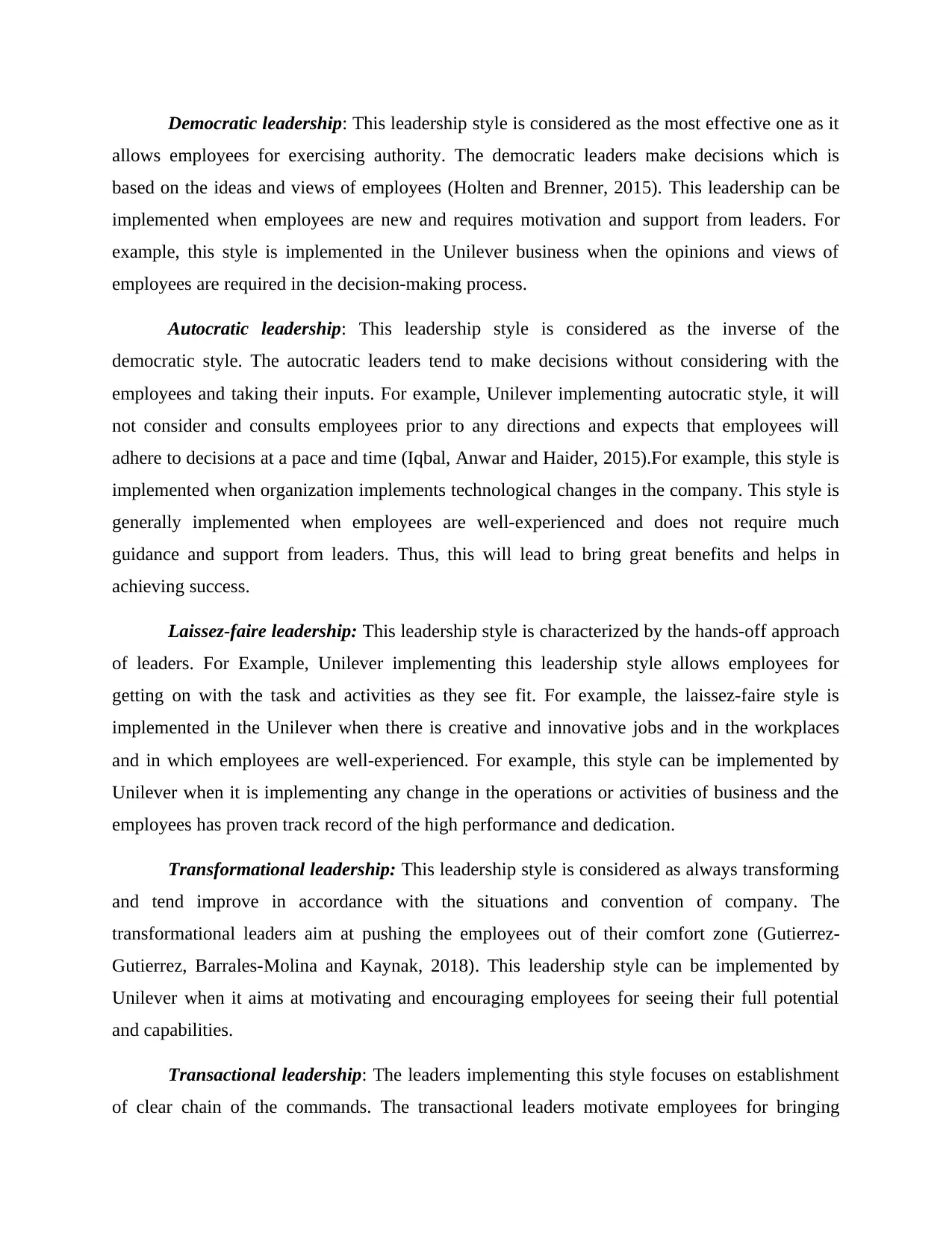
Democratic leadership: This leadership style is considered as the most effective one as it
allows employees for exercising authority. The democratic leaders make decisions which is
based on the ideas and views of employees (Holten and Brenner, 2015). This leadership can be
implemented when employees are new and requires motivation and support from leaders. For
example, this style is implemented in the Unilever business when the opinions and views of
employees are required in the decision-making process.
Autocratic leadership: This leadership style is considered as the inverse of the
democratic style. The autocratic leaders tend to make decisions without considering with the
employees and taking their inputs. For example, Unilever implementing autocratic style, it will
not consider and consults employees prior to any directions and expects that employees will
adhere to decisions at a pace and time (Iqbal, Anwar and Haider, 2015).For example, this style is
implemented when organization implements technological changes in the company. This style is
generally implemented when employees are well-experienced and does not require much
guidance and support from leaders. Thus, this will lead to bring great benefits and helps in
achieving success.
Laissez-faire leadership: This leadership style is characterized by the hands-off approach
of leaders. For Example, Unilever implementing this leadership style allows employees for
getting on with the task and activities as they see fit. For example, the laissez-faire style is
implemented in the Unilever when there is creative and innovative jobs and in the workplaces
and in which employees are well-experienced. For example, this style can be implemented by
Unilever when it is implementing any change in the operations or activities of business and the
employees has proven track record of the high performance and dedication.
Transformational leadership: This leadership style is considered as always transforming
and tend improve in accordance with the situations and convention of company. The
transformational leaders aim at pushing the employees out of their comfort zone (Gutierrez-
Gutierrez, Barrales-Molina and Kaynak, 2018). This leadership style can be implemented by
Unilever when it aims at motivating and encouraging employees for seeing their full potential
and capabilities.
Transactional leadership: The leaders implementing this style focuses on establishment
of clear chain of the commands. The transactional leaders motivate employees for bringing
allows employees for exercising authority. The democratic leaders make decisions which is
based on the ideas and views of employees (Holten and Brenner, 2015). This leadership can be
implemented when employees are new and requires motivation and support from leaders. For
example, this style is implemented in the Unilever business when the opinions and views of
employees are required in the decision-making process.
Autocratic leadership: This leadership style is considered as the inverse of the
democratic style. The autocratic leaders tend to make decisions without considering with the
employees and taking their inputs. For example, Unilever implementing autocratic style, it will
not consider and consults employees prior to any directions and expects that employees will
adhere to decisions at a pace and time (Iqbal, Anwar and Haider, 2015).For example, this style is
implemented when organization implements technological changes in the company. This style is
generally implemented when employees are well-experienced and does not require much
guidance and support from leaders. Thus, this will lead to bring great benefits and helps in
achieving success.
Laissez-faire leadership: This leadership style is characterized by the hands-off approach
of leaders. For Example, Unilever implementing this leadership style allows employees for
getting on with the task and activities as they see fit. For example, the laissez-faire style is
implemented in the Unilever when there is creative and innovative jobs and in the workplaces
and in which employees are well-experienced. For example, this style can be implemented by
Unilever when it is implementing any change in the operations or activities of business and the
employees has proven track record of the high performance and dedication.
Transformational leadership: This leadership style is considered as always transforming
and tend improve in accordance with the situations and convention of company. The
transformational leaders aim at pushing the employees out of their comfort zone (Gutierrez-
Gutierrez, Barrales-Molina and Kaynak, 2018). This leadership style can be implemented by
Unilever when it aims at motivating and encouraging employees for seeing their full potential
and capabilities.
Transactional leadership: The leaders implementing this style focuses on establishment
of clear chain of the commands. The transactional leaders motivate employees for bringing
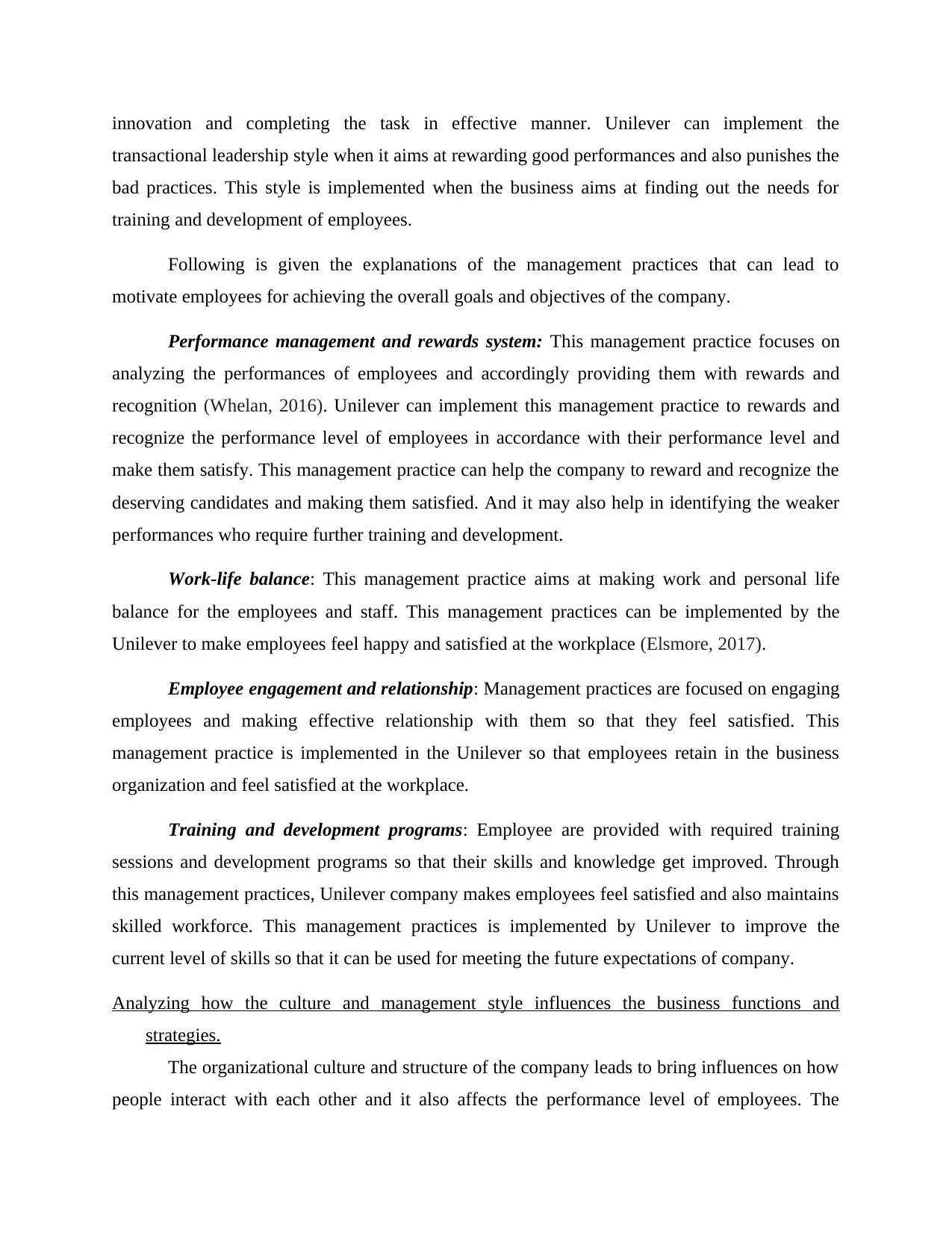
innovation and completing the task in effective manner. Unilever can implement the
transactional leadership style when it aims at rewarding good performances and also punishes the
bad practices. This style is implemented when the business aims at finding out the needs for
training and development of employees.
Following is given the explanations of the management practices that can lead to
motivate employees for achieving the overall goals and objectives of the company.
Performance management and rewards system: This management practice focuses on
analyzing the performances of employees and accordingly providing them with rewards and
recognition (Whelan, 2016). Unilever can implement this management practice to rewards and
recognize the performance level of employees in accordance with their performance level and
make them satisfy. This management practice can help the company to reward and recognize the
deserving candidates and making them satisfied. And it may also help in identifying the weaker
performances who require further training and development.
Work-life balance: This management practice aims at making work and personal life
balance for the employees and staff. This management practices can be implemented by the
Unilever to make employees feel happy and satisfied at the workplace (Elsmore, 2017).
Employee engagement and relationship: Management practices are focused on engaging
employees and making effective relationship with them so that they feel satisfied. This
management practice is implemented in the Unilever so that employees retain in the business
organization and feel satisfied at the workplace.
Training and development programs: Employee are provided with required training
sessions and development programs so that their skills and knowledge get improved. Through
this management practices, Unilever company makes employees feel satisfied and also maintains
skilled workforce. This management practices is implemented by Unilever to improve the
current level of skills so that it can be used for meeting the future expectations of company.
Analyzing how the culture and management style influences the business functions and
strategies.
The organizational culture and structure of the company leads to bring influences on how
people interact with each other and it also affects the performance level of employees. The
transactional leadership style when it aims at rewarding good performances and also punishes the
bad practices. This style is implemented when the business aims at finding out the needs for
training and development of employees.
Following is given the explanations of the management practices that can lead to
motivate employees for achieving the overall goals and objectives of the company.
Performance management and rewards system: This management practice focuses on
analyzing the performances of employees and accordingly providing them with rewards and
recognition (Whelan, 2016). Unilever can implement this management practice to rewards and
recognize the performance level of employees in accordance with their performance level and
make them satisfy. This management practice can help the company to reward and recognize the
deserving candidates and making them satisfied. And it may also help in identifying the weaker
performances who require further training and development.
Work-life balance: This management practice aims at making work and personal life
balance for the employees and staff. This management practices can be implemented by the
Unilever to make employees feel happy and satisfied at the workplace (Elsmore, 2017).
Employee engagement and relationship: Management practices are focused on engaging
employees and making effective relationship with them so that they feel satisfied. This
management practice is implemented in the Unilever so that employees retain in the business
organization and feel satisfied at the workplace.
Training and development programs: Employee are provided with required training
sessions and development programs so that their skills and knowledge get improved. Through
this management practices, Unilever company makes employees feel satisfied and also maintains
skilled workforce. This management practices is implemented by Unilever to improve the
current level of skills so that it can be used for meeting the future expectations of company.
Analyzing how the culture and management style influences the business functions and
strategies.
The organizational culture and structure of the company leads to bring influences on how
people interact with each other and it also affects the performance level of employees. The
⊘ This is a preview!⊘
Do you want full access?
Subscribe today to unlock all pages.

Trusted by 1+ million students worldwide
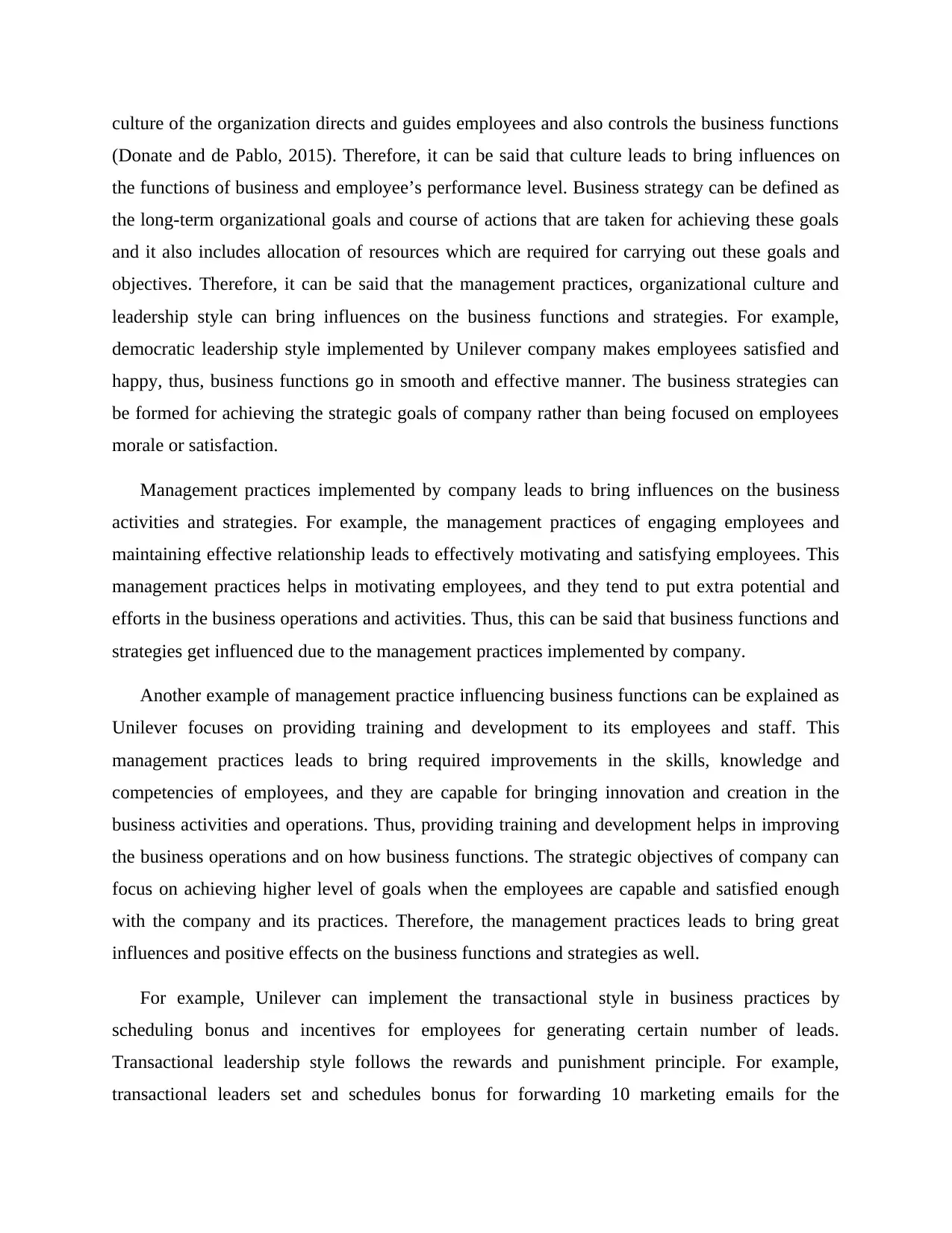
culture of the organization directs and guides employees and also controls the business functions
(Donate and de Pablo, 2015). Therefore, it can be said that culture leads to bring influences on
the functions of business and employee’s performance level. Business strategy can be defined as
the long-term organizational goals and course of actions that are taken for achieving these goals
and it also includes allocation of resources which are required for carrying out these goals and
objectives. Therefore, it can be said that the management practices, organizational culture and
leadership style can bring influences on the business functions and strategies. For example,
democratic leadership style implemented by Unilever company makes employees satisfied and
happy, thus, business functions go in smooth and effective manner. The business strategies can
be formed for achieving the strategic goals of company rather than being focused on employees
morale or satisfaction.
Management practices implemented by company leads to bring influences on the business
activities and strategies. For example, the management practices of engaging employees and
maintaining effective relationship leads to effectively motivating and satisfying employees. This
management practices helps in motivating employees, and they tend to put extra potential and
efforts in the business operations and activities. Thus, this can be said that business functions and
strategies get influenced due to the management practices implemented by company.
Another example of management practice influencing business functions can be explained as
Unilever focuses on providing training and development to its employees and staff. This
management practices leads to bring required improvements in the skills, knowledge and
competencies of employees, and they are capable for bringing innovation and creation in the
business activities and operations. Thus, providing training and development helps in improving
the business operations and on how business functions. The strategic objectives of company can
focus on achieving higher level of goals when the employees are capable and satisfied enough
with the company and its practices. Therefore, the management practices leads to bring great
influences and positive effects on the business functions and strategies as well.
For example, Unilever can implement the transactional style in business practices by
scheduling bonus and incentives for employees for generating certain number of leads.
Transactional leadership style follows the rewards and punishment principle. For example,
transactional leaders set and schedules bonus for forwarding 10 marketing emails for the
(Donate and de Pablo, 2015). Therefore, it can be said that culture leads to bring influences on
the functions of business and employee’s performance level. Business strategy can be defined as
the long-term organizational goals and course of actions that are taken for achieving these goals
and it also includes allocation of resources which are required for carrying out these goals and
objectives. Therefore, it can be said that the management practices, organizational culture and
leadership style can bring influences on the business functions and strategies. For example,
democratic leadership style implemented by Unilever company makes employees satisfied and
happy, thus, business functions go in smooth and effective manner. The business strategies can
be formed for achieving the strategic goals of company rather than being focused on employees
morale or satisfaction.
Management practices implemented by company leads to bring influences on the business
activities and strategies. For example, the management practices of engaging employees and
maintaining effective relationship leads to effectively motivating and satisfying employees. This
management practices helps in motivating employees, and they tend to put extra potential and
efforts in the business operations and activities. Thus, this can be said that business functions and
strategies get influenced due to the management practices implemented by company.
Another example of management practice influencing business functions can be explained as
Unilever focuses on providing training and development to its employees and staff. This
management practices leads to bring required improvements in the skills, knowledge and
competencies of employees, and they are capable for bringing innovation and creation in the
business activities and operations. Thus, providing training and development helps in improving
the business operations and on how business functions. The strategic objectives of company can
focus on achieving higher level of goals when the employees are capable and satisfied enough
with the company and its practices. Therefore, the management practices leads to bring great
influences and positive effects on the business functions and strategies as well.
For example, Unilever can implement the transactional style in business practices by
scheduling bonus and incentives for employees for generating certain number of leads.
Transactional leadership style follows the rewards and punishment principle. For example,
transactional leaders set and schedules bonus for forwarding 10 marketing emails for the
Paraphrase This Document
Need a fresh take? Get an instant paraphrase of this document with our AI Paraphraser
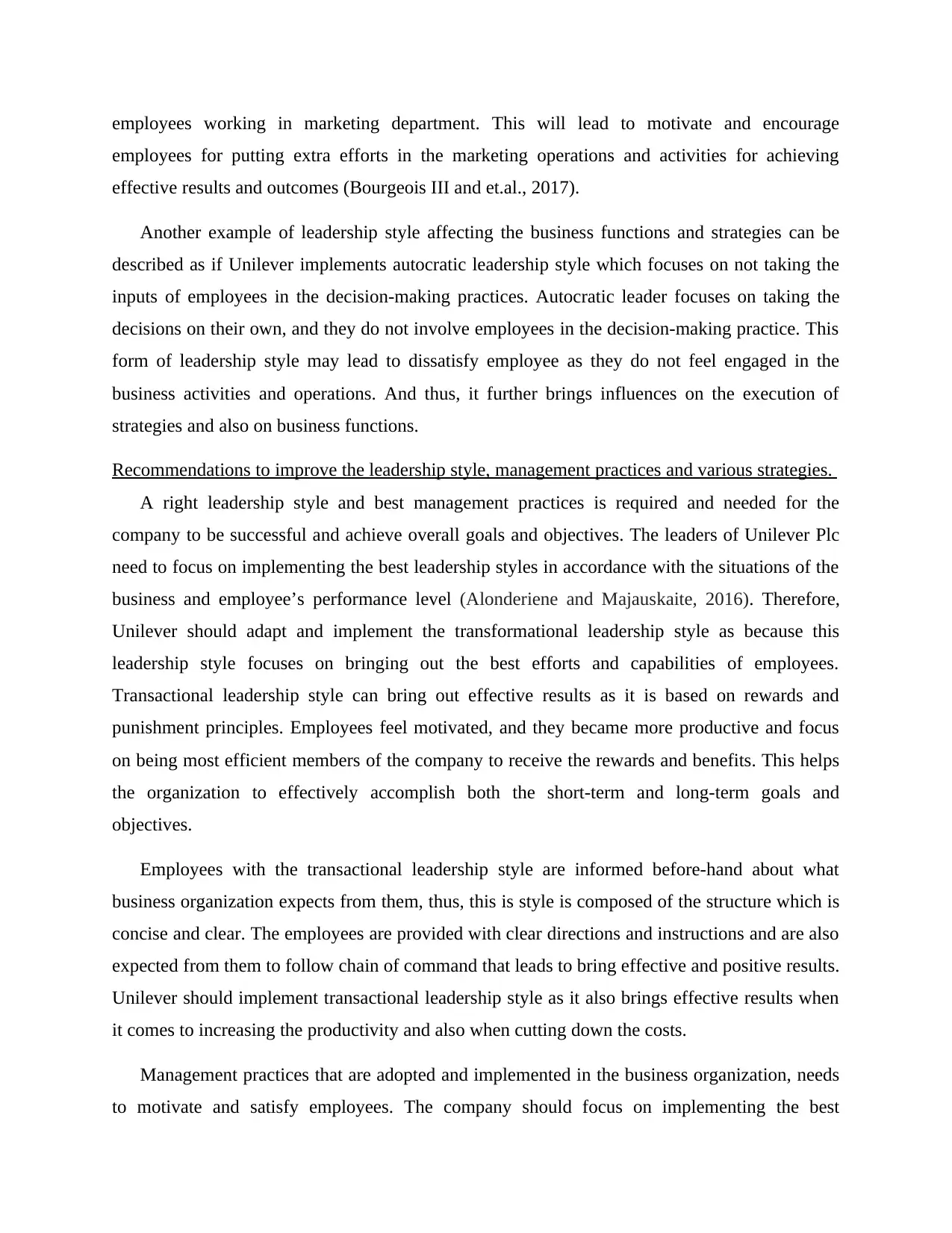
employees working in marketing department. This will lead to motivate and encourage
employees for putting extra efforts in the marketing operations and activities for achieving
effective results and outcomes (Bourgeois III and et.al., 2017).
Another example of leadership style affecting the business functions and strategies can be
described as if Unilever implements autocratic leadership style which focuses on not taking the
inputs of employees in the decision-making practices. Autocratic leader focuses on taking the
decisions on their own, and they do not involve employees in the decision-making practice. This
form of leadership style may lead to dissatisfy employee as they do not feel engaged in the
business activities and operations. And thus, it further brings influences on the execution of
strategies and also on business functions.
Recommendations to improve the leadership style, management practices and various strategies.
A right leadership style and best management practices is required and needed for the
company to be successful and achieve overall goals and objectives. The leaders of Unilever Plc
need to focus on implementing the best leadership styles in accordance with the situations of the
business and employee’s performance level (Alonderiene and Majauskaite, 2016). Therefore,
Unilever should adapt and implement the transformational leadership style as because this
leadership style focuses on bringing out the best efforts and capabilities of employees.
Transactional leadership style can bring out effective results as it is based on rewards and
punishment principles. Employees feel motivated, and they became more productive and focus
on being most efficient members of the company to receive the rewards and benefits. This helps
the organization to effectively accomplish both the short-term and long-term goals and
objectives.
Employees with the transactional leadership style are informed before-hand about what
business organization expects from them, thus, this is style is composed of the structure which is
concise and clear. The employees are provided with clear directions and instructions and are also
expected from them to follow chain of command that leads to bring effective and positive results.
Unilever should implement transactional leadership style as it also brings effective results when
it comes to increasing the productivity and also when cutting down the costs.
Management practices that are adopted and implemented in the business organization, needs
to motivate and satisfy employees. The company should focus on implementing the best
employees for putting extra efforts in the marketing operations and activities for achieving
effective results and outcomes (Bourgeois III and et.al., 2017).
Another example of leadership style affecting the business functions and strategies can be
described as if Unilever implements autocratic leadership style which focuses on not taking the
inputs of employees in the decision-making practices. Autocratic leader focuses on taking the
decisions on their own, and they do not involve employees in the decision-making practice. This
form of leadership style may lead to dissatisfy employee as they do not feel engaged in the
business activities and operations. And thus, it further brings influences on the execution of
strategies and also on business functions.
Recommendations to improve the leadership style, management practices and various strategies.
A right leadership style and best management practices is required and needed for the
company to be successful and achieve overall goals and objectives. The leaders of Unilever Plc
need to focus on implementing the best leadership styles in accordance with the situations of the
business and employee’s performance level (Alonderiene and Majauskaite, 2016). Therefore,
Unilever should adapt and implement the transformational leadership style as because this
leadership style focuses on bringing out the best efforts and capabilities of employees.
Transactional leadership style can bring out effective results as it is based on rewards and
punishment principles. Employees feel motivated, and they became more productive and focus
on being most efficient members of the company to receive the rewards and benefits. This helps
the organization to effectively accomplish both the short-term and long-term goals and
objectives.
Employees with the transactional leadership style are informed before-hand about what
business organization expects from them, thus, this is style is composed of the structure which is
concise and clear. The employees are provided with clear directions and instructions and are also
expected from them to follow chain of command that leads to bring effective and positive results.
Unilever should implement transactional leadership style as it also brings effective results when
it comes to increasing the productivity and also when cutting down the costs.
Management practices that are adopted and implemented in the business organization, needs
to motivate and satisfy employees. The company should focus on implementing the best
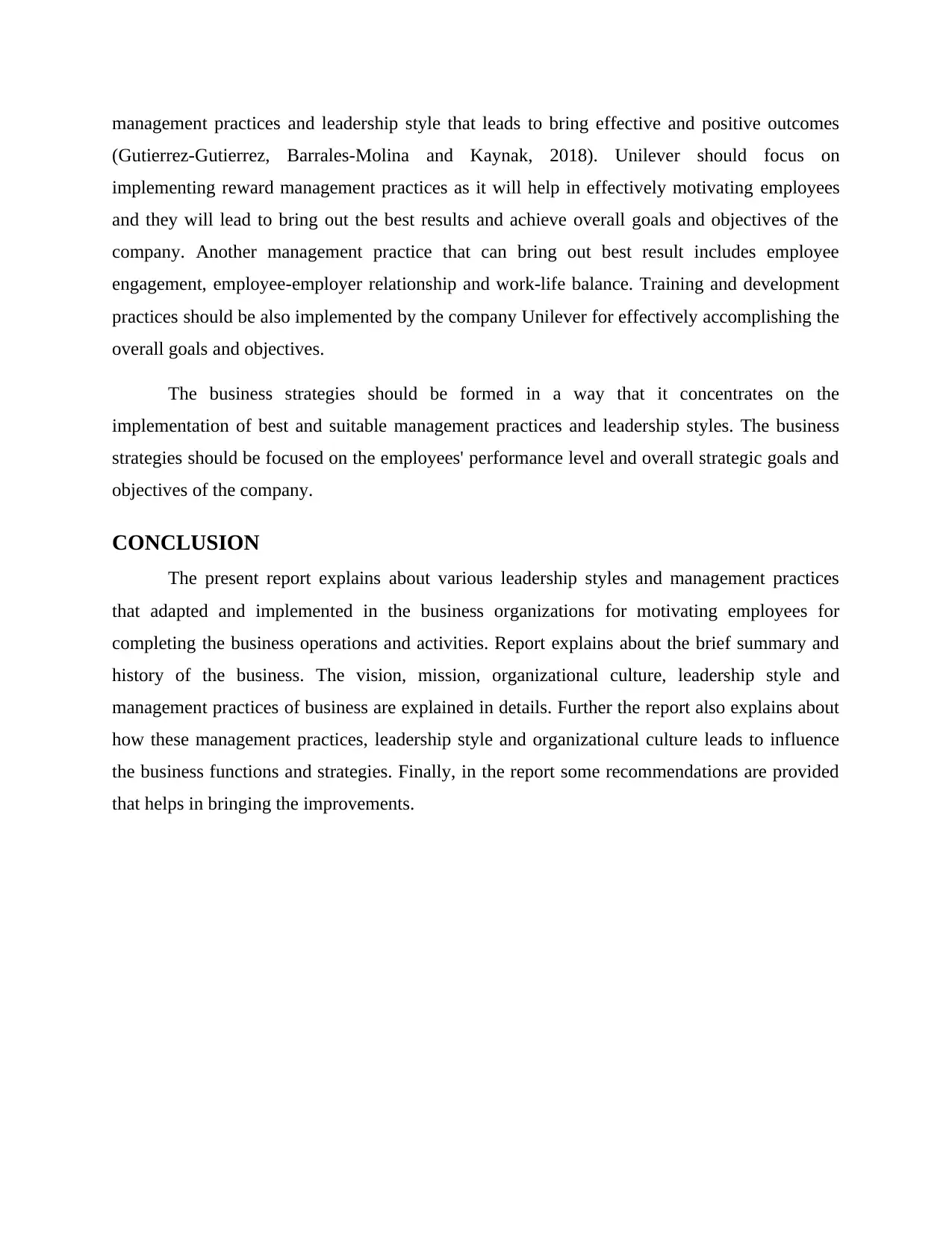
management practices and leadership style that leads to bring effective and positive outcomes
(Gutierrez-Gutierrez, Barrales-Molina and Kaynak, 2018). Unilever should focus on
implementing reward management practices as it will help in effectively motivating employees
and they will lead to bring out the best results and achieve overall goals and objectives of the
company. Another management practice that can bring out best result includes employee
engagement, employee-employer relationship and work-life balance. Training and development
practices should be also implemented by the company Unilever for effectively accomplishing the
overall goals and objectives.
The business strategies should be formed in a way that it concentrates on the
implementation of best and suitable management practices and leadership styles. The business
strategies should be focused on the employees' performance level and overall strategic goals and
objectives of the company.
CONCLUSION
The present report explains about various leadership styles and management practices
that adapted and implemented in the business organizations for motivating employees for
completing the business operations and activities. Report explains about the brief summary and
history of the business. The vision, mission, organizational culture, leadership style and
management practices of business are explained in details. Further the report also explains about
how these management practices, leadership style and organizational culture leads to influence
the business functions and strategies. Finally, in the report some recommendations are provided
that helps in bringing the improvements.
(Gutierrez-Gutierrez, Barrales-Molina and Kaynak, 2018). Unilever should focus on
implementing reward management practices as it will help in effectively motivating employees
and they will lead to bring out the best results and achieve overall goals and objectives of the
company. Another management practice that can bring out best result includes employee
engagement, employee-employer relationship and work-life balance. Training and development
practices should be also implemented by the company Unilever for effectively accomplishing the
overall goals and objectives.
The business strategies should be formed in a way that it concentrates on the
implementation of best and suitable management practices and leadership styles. The business
strategies should be focused on the employees' performance level and overall strategic goals and
objectives of the company.
CONCLUSION
The present report explains about various leadership styles and management practices
that adapted and implemented in the business organizations for motivating employees for
completing the business operations and activities. Report explains about the brief summary and
history of the business. The vision, mission, organizational culture, leadership style and
management practices of business are explained in details. Further the report also explains about
how these management practices, leadership style and organizational culture leads to influence
the business functions and strategies. Finally, in the report some recommendations are provided
that helps in bringing the improvements.
⊘ This is a preview!⊘
Do you want full access?
Subscribe today to unlock all pages.

Trusted by 1+ million students worldwide
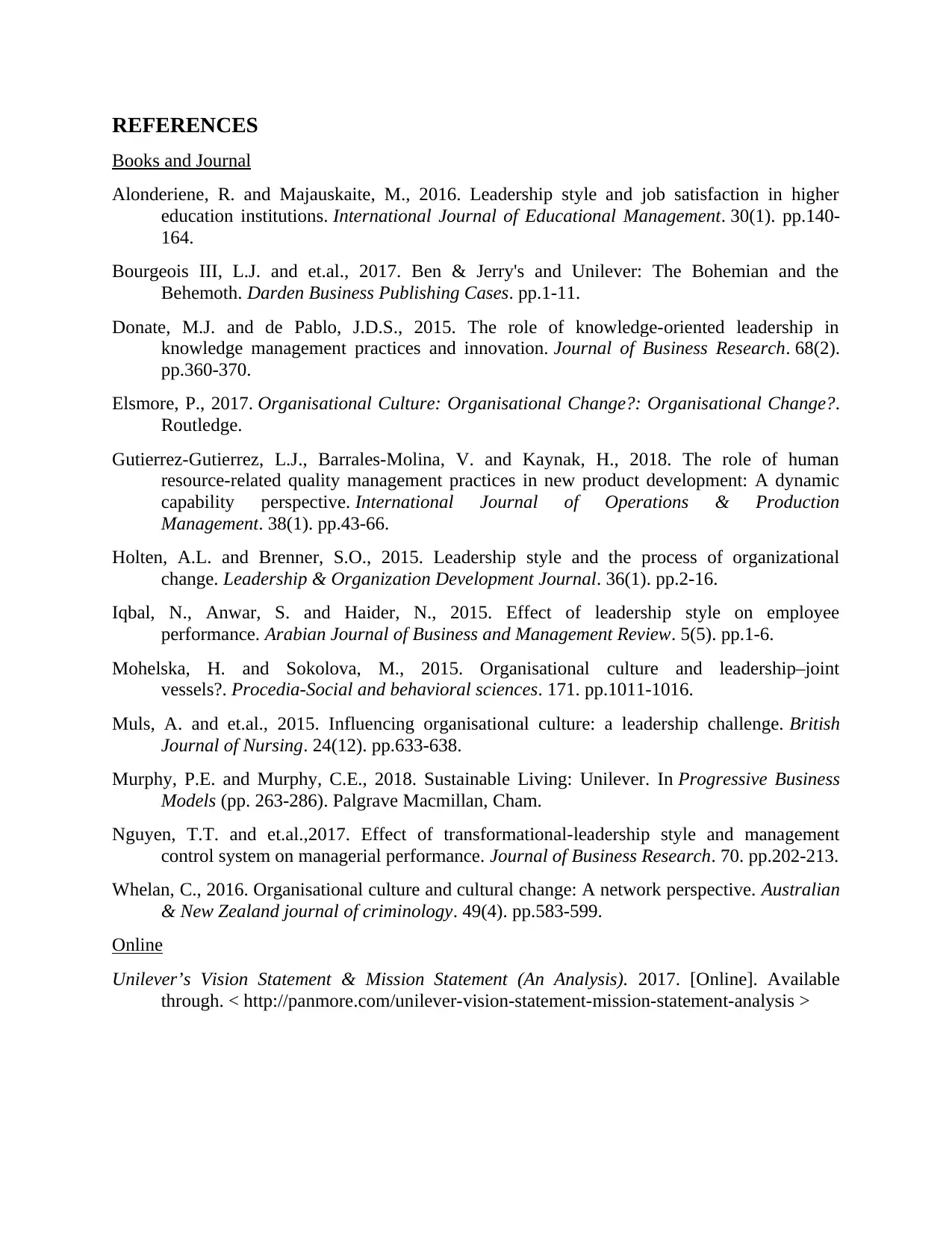
REFERENCES
Books and Journal
Alonderiene, R. and Majauskaite, M., 2016. Leadership style and job satisfaction in higher
education institutions. International Journal of Educational Management. 30(1). pp.140-
164.
Bourgeois III, L.J. and et.al., 2017. Ben & Jerry's and Unilever: The Bohemian and the
Behemoth. Darden Business Publishing Cases. pp.1-11.
Donate, M.J. and de Pablo, J.D.S., 2015. The role of knowledge-oriented leadership in
knowledge management practices and innovation. Journal of Business Research. 68(2).
pp.360-370.
Elsmore, P., 2017. Organisational Culture: Organisational Change?: Organisational Change?.
Routledge.
Gutierrez-Gutierrez, L.J., Barrales-Molina, V. and Kaynak, H., 2018. The role of human
resource-related quality management practices in new product development: A dynamic
capability perspective. International Journal of Operations & Production
Management. 38(1). pp.43-66.
Holten, A.L. and Brenner, S.O., 2015. Leadership style and the process of organizational
change. Leadership & Organization Development Journal. 36(1). pp.2-16.
Iqbal, N., Anwar, S. and Haider, N., 2015. Effect of leadership style on employee
performance. Arabian Journal of Business and Management Review. 5(5). pp.1-6.
Mohelska, H. and Sokolova, M., 2015. Organisational culture and leadership–joint
vessels?. Procedia-Social and behavioral sciences. 171. pp.1011-1016.
Muls, A. and et.al., 2015. Influencing organisational culture: a leadership challenge. British
Journal of Nursing. 24(12). pp.633-638.
Murphy, P.E. and Murphy, C.E., 2018. Sustainable Living: Unilever. In Progressive Business
Models (pp. 263-286). Palgrave Macmillan, Cham.
Nguyen, T.T. and et.al.,2017. Effect of transformational-leadership style and management
control system on managerial performance. Journal of Business Research. 70. pp.202-213.
Whelan, C., 2016. Organisational culture and cultural change: A network perspective. Australian
& New Zealand journal of criminology. 49(4). pp.583-599.
Online
Unilever’s Vision Statement & Mission Statement (An Analysis). 2017. [Online]. Available
through. < http://panmore.com/unilever-vision-statement-mission-statement-analysis >
Books and Journal
Alonderiene, R. and Majauskaite, M., 2016. Leadership style and job satisfaction in higher
education institutions. International Journal of Educational Management. 30(1). pp.140-
164.
Bourgeois III, L.J. and et.al., 2017. Ben & Jerry's and Unilever: The Bohemian and the
Behemoth. Darden Business Publishing Cases. pp.1-11.
Donate, M.J. and de Pablo, J.D.S., 2015. The role of knowledge-oriented leadership in
knowledge management practices and innovation. Journal of Business Research. 68(2).
pp.360-370.
Elsmore, P., 2017. Organisational Culture: Organisational Change?: Organisational Change?.
Routledge.
Gutierrez-Gutierrez, L.J., Barrales-Molina, V. and Kaynak, H., 2018. The role of human
resource-related quality management practices in new product development: A dynamic
capability perspective. International Journal of Operations & Production
Management. 38(1). pp.43-66.
Holten, A.L. and Brenner, S.O., 2015. Leadership style and the process of organizational
change. Leadership & Organization Development Journal. 36(1). pp.2-16.
Iqbal, N., Anwar, S. and Haider, N., 2015. Effect of leadership style on employee
performance. Arabian Journal of Business and Management Review. 5(5). pp.1-6.
Mohelska, H. and Sokolova, M., 2015. Organisational culture and leadership–joint
vessels?. Procedia-Social and behavioral sciences. 171. pp.1011-1016.
Muls, A. and et.al., 2015. Influencing organisational culture: a leadership challenge. British
Journal of Nursing. 24(12). pp.633-638.
Murphy, P.E. and Murphy, C.E., 2018. Sustainable Living: Unilever. In Progressive Business
Models (pp. 263-286). Palgrave Macmillan, Cham.
Nguyen, T.T. and et.al.,2017. Effect of transformational-leadership style and management
control system on managerial performance. Journal of Business Research. 70. pp.202-213.
Whelan, C., 2016. Organisational culture and cultural change: A network perspective. Australian
& New Zealand journal of criminology. 49(4). pp.583-599.
Online
Unilever’s Vision Statement & Mission Statement (An Analysis). 2017. [Online]. Available
through. < http://panmore.com/unilever-vision-statement-mission-statement-analysis >
1 out of 10
Related Documents
Your All-in-One AI-Powered Toolkit for Academic Success.
+13062052269
info@desklib.com
Available 24*7 on WhatsApp / Email
![[object Object]](/_next/static/media/star-bottom.7253800d.svg)
Unlock your academic potential
Copyright © 2020–2026 A2Z Services. All Rights Reserved. Developed and managed by ZUCOL.





